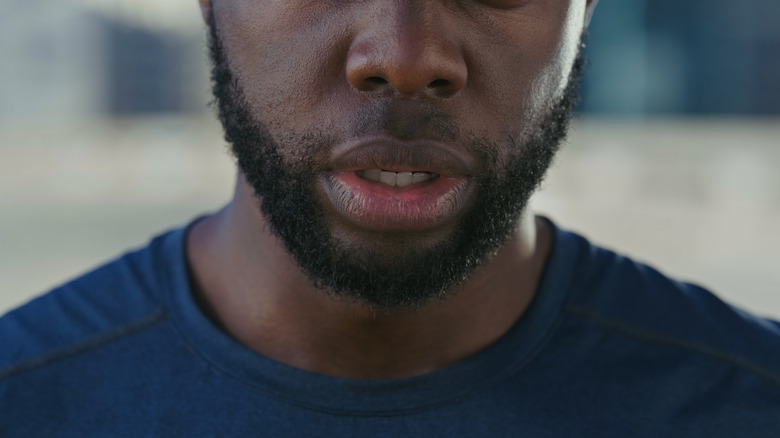Sleep is important. You probably already know that. But more often than not, there’s something that always gets in the way of quality sleep: the TV, your next-door neighbor, a snoring pet, and sometimes even just the way your jaw is shaped.
An altered jaw — either due to genetics, poor dental health, or injury — can disrupt how you sleep, per Deldar Dental. One of the genetic conditions that manifest in an overbite and also causes sleep problems is called micrognathia, a face shape in which the lower jaw is undersized (via Sleep Foundation). In fact, about 88% of children with micrognathia have sleep apnea. Sleep apnea is a condition that causes problems with how you breathe. With micrognathia, since your lower jaw is a lot smaller than your upper one, your tongue can fall backward and obstruct your breathing.
This isn’t the only condition that links jaw shape to sleep problems, though. Chronic mouth breathing can also alter the shape of your face and result in lack of sleep.
Mouth breathing can result in an ‘adenoid face’
Mouth breathing?
♬ original sound – Dr Karan Raj
Watch on TikTok
When we talk about “chronic mouth breathing,” we’re not referring to those times when you breathe through your mouth while exercising or lifting something heavy. This is, quite literally, when you mouth breathe most of the time. Turns out that this breathing style can alter the shape of someone’s face, which in turn can disrupt their sleep. Talk about a vicious cycle.
“Children [who mouth breathe] will typically develop smaller mid-faces, nasal cavities, and jaws since they don’t experience the normal air resistance,” shared Dr. Kami Hoss, a San Diego-based dentist and author of the book “If Your Mouth Could Talk: An In-Depth Guide to Oral Health and Its Impact on Your Entire Life” (via Sleepopolis). In other words, an adenoid face – a face that has an open-mouthed appearance and a shorter upper lip.
“When you breathe through your nose, your tongue naturally fills your palate space and exerts an upward and outward pressure. It promotes forward growth of the jawbones,” explained Dr. Albert Silvera, a Beverly Hills-based doctor of dental surgery, to Allure. When this pressure is non-existent (thanks to mouth breathing), “the bottom jaw never grows forward fully and [can] lead to an obtuse bottom jaw angle, a retruded chin, crowding of the teeth, and a constriction of the space where the tongue is supposed to rest,” added the dental surgeon. The narrower airways that come from mouth-breathing-related changes in jaw shape can cause sleep problems (via Allure).
What are the other problems associated with mouth breathing?

In addition to ruining your sleep and altering the way your jaws look (if you’ve been a mouth breather since childhood), bad breath, gingivitis, tooth cavities, and infections of the ear and throat are some other issues that can come up with mouth breathing (via HuffPost).
When you breathe through your nose, your nose automatically filters out certain particles like allergens and pollution, per the Cleveland Clinic. Your mouth doesn’t have the same filtering system. Also, the resistance that comes with breathing through your nose enables you to take in more oxygen compared to when you’re mouth breathing, notes Healthline. Not getting enough oxygen can lead to other health problems like reduced lung function, high blood pressure, and heart conditions.
While you might not be able to change the shape of your face once you’ve reached adulthood, you can work toward learning to breathe through your nose. Consult with a physician first to see what they recommend.